- Home
- Jane Smiley
Saddles & Secrets (An Ellen & Ned Book) Page 3
Saddles & Secrets (An Ellen & Ned Book) Read online
Page 3
When Abby came over to me, I said, “I never saw anything like that before.”
“That was a first for me, too.”
“What part was the carrot and what part was the stick?”
Abby was quiet for a second, then said, “Only he would know. But he’s pretty much the smartest horse I’ve ever seen. Unless I didn’t know what I was seeing.”
I said, “He didn’t seem afraid. He seemed amazed and then fascinated.”
“I thought so, too.”
“I wish he would talk to Ned.”
Abby sighed. “I think he does talk to Ned, but he only says mean things.”
I kept my mouth shut, but I did wonder how she knew.
Hot Potato and I led the walk back to the stables. He was, of course, good. Jane brought up the rear, and Melinda stuck herself firmly between Sophia and Abby, as if that was the safest place, but Blue didn’t do one bad thing. The walk back was, like all walks back, much shorter than the walk out, and I mean what I say, even though my watch said a different thing—my watch said it was only a little shorter. When we came out of the forest into the area where the arenas are, Melinda looked like she was about to collapse from exhaustion, so Abby and Jane went to her, and I followed Sophia into the arena and did exactly what she was doing, and if they had asked me, I would have said that that was what I thought I was supposed to do, although I could see our car out of the corner of my eye, and I knew that I was five minutes past my regular lesson time.
Sophia trotted. I trotted. Sophia circled. I circled. Sophia eased up into the canter. I eased up into the canter. Sophia trotted again, then cantered the whole way around the arena. I trotted again, then cantered the whole way around the arena. Now that I’d ridden Blue, I realized that the problem with Hot Potato was that his canter was just bumping along, nothing at all like being inside a dream, the way it was with Blue. Sophia turned and jumped two jumps. I did not turn and jump two jumps. I went back down to the walk and moseyed along, as my grandma would say—still, I have to admit, not noticing either my dad’s car or my dad. I kept moseying, Sophia kept jumping, and at last Abby came into the arena. I was caught. I stopped and smiled. You always have to smile when you’re not behaving properly.
She ran her hand down Hot Potato’s side, then felt the hair between his front legs—that’s how you tell whether a horse is heated up or cooled down. She said, “He’s cool enough. One more circuit around the arena, then you can put him away. Rodney will untack him, because your dad’s here.”
I said, “Oh,” which is better than saying, “I didn’t see him.”
I walked around as slowly as I could. There are people, like Abby and Sophia and Jane, who ride every day of the week, or could if they wanted to. I want to be one of those people, but I cannot be. I patted Hot Potato a little along his mane and said, “What do you want to be, Potato? Or, Tater. I will call you Tater, because that’s what Dad sometimes says about Mom’s mashed potatoes—‘Great taters, honey!’ So, Tater, what do you want to be?”
He tossed his head to get rid of a fly and didn’t answer.
But Dad wasn’t in any hurry to get home. The weather was nice, and he stood there, leaning against the car with his hands in his pockets, facing the forest. I saw him taking some deep breaths, so he must like that pine smell. I said to Rodney when I was dismounting, “Does it always smell like it just got cleaned around here?”
“Aye, you mean that pine scent. Yer mam must use Pine-Sol. I use it meself. Nay, it’s the weather and the time of year, especially on a warm day like today. Lovely.”
I patted the pony one last time, but I didn’t have any treats. He didn’t seem to care, walking away without looking. Now Dad came over and said, “Where’s Abby? I want to give her this.” He pulled a piece of paper out of his pocket—I knew it was a check, for my riding lessons. It was folded up. I took it and said, “I’ll give it to her,” and ran off before he could stop me. There are kids, most of them boys, who don’t know when they’re misbehaving, but I do.
Abby was heading for Jane’s office, but I held out the check and she stopped. After she took it, while she was putting it in her pocket, I said, “How is Ben?”
“Oh. Ben. Didn’t I tell you? He went to a barn down south that specializes in dressage. He’s not a bad jumper, but he turned out to have amazing stretch and spring, especially in the trot, so that seemed like a good fit for him.”
“What is spring?”
“When the back end is really strong, so it’s easier for them to extend. I’ll show you pictures sometime. I have a book.”
“When did he leave?”
“About a month ago.”
“Well,” I said, “I think Ned is lonely, and when he stares up the hill, he’s looking for a friend.”
Abby’s eyebrows went up a little bit, and then she cocked her head and patted me on the shoulder. She said, “Maybe. We’ll see.”
That afternoon, we took Joan Ariel to Grandma’s to have Grandpa’s favorite dinner—crab bisque, chicken schnitzel, and cherry pie with vanilla ice cream. It was Grandpa’s birthday—sixty-six (he was born in 1901)—and as we walked to their house, I divided the number 66 into all of its parts (33, 2, 3, 11), then I added them up in various ways (44, 5, 6, 2). The numbers seemed to me to be little tiny statues on the lawns we passed. I like numbers.
Joan Ariel got to eat bites of everything, and she opened her mouth like a bird and took it all in, which is not to say that she’s good all the time, because most nights she cries for a long time before falling asleep, and some mornings she’s very fussy.
After we sang “Happy Birthday,” we each asked Grandpa to tell a story from a certain year. I went last. For Dad, Grandpa told a story about his dad buying a Model T Ford, when Grandpa was eleven, for six hundred and fifty dollars. For Mom, Grandpa told about when he turned twenty-five and he spent all the money he’d saved, which was sixty-five dollars, on a brown tweed suit, very flashy, and a pair of brown-and-white wing-tip shoes, all so he could go to a dance where he would see Grandma and chat with her, and she would think he was from New York, or at least LA, but when they got to talking, he realized that she knew he was from our town, and furthermore, she had had her eye on him for ten years. Grandma laughed and said, “That is not true, I did not have my eye on you, but at least I knew that you lived two blocks away and you walked past my house almost every day, even though you never realized it!” And then we laughed. Grandma said, “I still have the dress that I wore to that dance. My aunt sewed it. Someday, all of that will come back into style, I’m sure! Everything looked so beautiful in those days anyway.” I asked to see the dress, and she said she would find it sometime.
Grandma asked what Grandpa’s very first memory was, and he swore that it was from when he was Joan Ariel’s age, sitting up and staring at his feet, and Grandma said that was impossible, and everyone laughed again, including Joan Ariel. Now it was my turn. Sixty-six divided by four (me, Grandma, Mom, Dad) is sixteen and a half, so I asked for a story from the spring of 1918. Grandpa looked at me for a moment, then said, “Oh, that spring, that wasn’t a good spring, and I knew it at the time. Two boys who lived down the street went off to camp because of the war, and they were excited!”
I said, “Which war?”
“The First World War. Have they talked about that in your school yet?”
I shook my head.
“Well, I was too young that spring, but my eyes were open. It wasn’t like other wars. I knew it would be bad.”
Mom started to shake her head, and Grandma took Joan Ariel into the kitchen. Grandpa sighed, then said, “Well, it turned out I didn’t have to go, and one of those boys, George Samuels, he came back okay. The other one, he got gassed because he took off his gas mask at the wrong time. He died.”
There was a long silence. I knew I should have picked another year. But th
en Grandpa said, “Well, darling, you will like this. The previous spring, the spring of 1917, was when Man o’ War was born. He was the greatest racehorse of all time, and a tremendous beauty, too. I didn’t know it then, nobody did, but that was a good thing to come out of a bad year. Beautiful chestnut.”
I said, “There’s a book about Man o’ War. I saw it at the library, but I haven’t checked it out yet.”
“I hope it has pictures.”
I decided to check it out tomorrow.
Maybe because of all the things we’d talked about, and then because the weather was so bright and sparkly when we were walking home later (and I was imagining Ned walking with us, like a dog), I had a very long and vivid dream that I hope I never forget. I was on the beach, though not at the cove, and other people were behind me, but I didn’t turn around to look at them. I was on a horse that looked and acted just like Gee Whiz, but he was a chestnut. I was sitting on him, and he was playing in the waves, and then he began to swim out into the ocean—after a little while, I could feel him swimming underneath me. His head was up, and his ears were pricked, and he was very strong. In the dream, I was not afraid at all. Out in the middle of the bay, two porpoises began swimming around us in a circle, which made me a little dizzy, and this went on so long that I thought we were getting near another beach, the one across the bay.
And then I woke up, and even though I hadn’t been afraid in the dream, I was afraid now, so I sat up in bed and I touched the wall and the headboard and the bedside table and the two books on the table, and I stuck my feet out from under the covers and put them on the wood floor, which was chilly and woke me up. Then I went back to sleep, but when I woke up in the morning, I stayed in bed for a while, trying to decide whether it was a bad dream or a good dream. What I decided was that the whole twenty-four hours since going out to the stables for my ride had been so strange that I would be really glad, the next day, to get up and walk to school and be bored for a while.
Later, though, I did walk to the library with Mom and Joan Ariel, and I did check out the Man o’ War book, and at bedtime, I was a little sad that no matter how hard I tried to close my eyes and look for Ned so that I could tell him about all the things we had done, he wasn’t there.
* * *
—
Monday morning, when I went out our front door, I was looking at my saddle shoes, partly to decide whether they were properly tied, but also because now that Mom had shown me a picture of wing tips, I was imagining having a pair of those. That was why I didn’t see Jimmy Murphy walking up the street. That was okay, though, because when you are walking a few steps behind someone, you can spy on him and nobody says a word about it. Jimmy is always late to school and I am always early, which is why I never see him. And usually he is dressed in jeans and a T-shirt. One time, I heard him tell Frankie Crandall that he liked his jeans to be so dirty that he could take them off at night and they would stand up in the corner of his room. When I heard this, I laughed to myself, but maybe it wasn’t a joke. Today, he was wearing khaki pants, nice loafers, and a blue shirt. His hair was cut (Mrs. Murphy cuts all the boys’ hair herself). He started out walking fast and then he slowed down like he just couldn’t help himself, and so I caught up with him. We were almost there. I said, “You look nice.”
“But I’m not.”
“Excuse me?”
He shook his head, and he had a really sad look on his face.
When we got to the corner, a car went past, and then another. We stood there. Finally, because somebody had to do it, I said, “What’s wrong?”
He shook his head again.
And about a moment later, a tear came out of the corner of his eye and rolled down his face. It glinted. I put my hand on his shirt and turned right. I thought we could be late, because I never am and he always is. We started walking. Two times I said, “Tell me,” and then at the next corner, he looked at me and said, “What did you do yesterday?”
“We went to the library. What did you do?”
“We spent the day at the hospital.”
I knew I had to say this: “Why?”
“Because when everyone was getting dressed for ten o’clock Mass, I got mad at Brian and threw something at him. I didn’t mean to hit him, but he moved and the thing hit him and knocked him out. He got a concussion. Do you know what that is?”
I nodded. Everyone who rides horses knows what a concussion is. Then I said, “What did you throw at him?”
He held up our social studies book, which is pretty big because it has maps. I always do my social studies homework at school so I don’t have to carry that book back and forth. We were now walking downhill, away from the school. I said, “Is Brian okay?”
Jimmy shrugged. Then he said, “Mea culpa, mea culpa, mea maxima culpa.”
“What does that mean?”
“My fault. My fault. My biggest fault.” He sighed. “I think my family hates me now.”
“Do you have to start being good all the time?”
“I think so.”
We walked to the bottom of the street and stopped at the corner. I said, “Then we’d better get to school. Between you and me, just keep your eye on Melanie and copycat her. She’s always good. She is from the Planet of the Good, and she can’t help herself.”
Jimmy smiled like this was funny, and we turned around and walked back up the street. We were ten minutes late. I went in first, walked over to Mr. Nathan, apologized for being late, smiled, and went to my desk. Jimmy did what I did, instead of just scooting to his desk, sitting down, and grinning the way he usually does. Mr. Nathan gave him one of those “Are you kidding me?” looks, and then we continued with the morning work, which was spelling. I like spelling. I like that “toe” and “though” rhyme with “blow,” but “plow” doesn’t.
And Jimmy Murphy kept to himself all day, even at lunch and at recess after lunch. The other boys might have teased him, but they didn’t dare, I guess. After school got out, I saw him go in the door of the school library. Of course I went straight home and found my mom and asked her, “Do you know what happened to Brian Murphy?”
She was sitting in the easy chair by the window in the living room, the window that looks across the street, and for sure, since both the window and the door were closed, no Murphy could hear her, but she lowered her voice anyway and said, “They think he’ll be all right. That just happens with little kids, they fall down and hit their heads. Just happens.” She gave Joan Ariel a kiss on the forehead. “So many children! It’s a wonder nothing’s happened before this.”
I said, “Remember last winter, when Brian liked to sit by the curb and put leaves and sticks in puddles and watch them float down the hill?”
“I saw that one time.”
“He did it all the time.”
“That’s just what I’m saying.” She put her arm around me and gave me a little squeeze. I said, “What made him fall down?”
“No one knows. Must have been running around and slipped. Teresa does her best, but that house is a mess.”
I didn’t say anything and went upstairs to change out of my school clothes.
I didn’t think much about Jimmy Murphy after that until I was walking through the living room to get an oatmeal cookie, as my reward for answering all of my division problems correctly, and heard Dad talking about how he missed one of his favorite TV shows. Mom watched it sometimes with him, but it isn’t on anymore. The name of the show was, I am not kidding, I’ve Got a Secret. This show came on on Monday nights, and Dad had been watching it my whole life. That word “secret” got stuck in my head: “I’ve got a secret. I’ve got a secret.” I went into the kitchen and stood over the cookie jar. When I lifted the lid, I said, “Secret, I am leaving you in this jar,” and then I took out my cookie and put the lid on so that it fit perfectly. I went into the living room. Dad was watching another show, tap
ping his fingers and nodding his head from side to side in time with the music. Dad loves music. In the closet of his and Mom’s room there is a black case with a trumpet in it. He never plays it, but he used to. I listened to the man play the song, which afterward they said was “Here We Go Again,” and I let that song push my secret, a real secret, out of my head. I did that again before I fell asleep, and again in the morning when I saw Jimmy Murphy across the classroom, still being good, this time dressed in a white shirt. And I did it again when I was walking home and saw Jane Murphy and Brian sitting on their porch steps.
It is exhausting to keep a secret when half the time you don’t even know whether you’re talking or not. I would have said that my conversations with Ned were a secret, but maybe not, maybe I did talk about them, and maybe everyone thought that I was just telling a story. And maybe I was. I was beginning to think that I had told this story all spring, and now that story was over. This made me sad, especially since the Tater story wasn’t as good as the Ned story. Tater is a nice pony and such a strange color that everyone looks at him. I knew that if I went to a horse show on Tater, he would go around all the jumps, and people would give me lots of compliments, and my dad would take pictures, and it would be a dream come true, but so far, it didn’t feel like a dream come true, because riding Tater was like driving a car—turn it on, go somewhere, turn it off, forget about it.
Anyway, until Thursday, I paid attention to whether I was saying anything at all about Jimmy Murphy—at home, at school, at recess, at lunch, looking out the window, looking out the door, when Mom was around, when Dad was around. I’m sure that some people, maybe even Melanie, would have said that I should tell Jimmy’s secret, but I thought that it wasn’t my business. If I wanted to tell his secret, then I should have gone to him and told him that I was going to. But he stayed away from me—no spitballs, no jokes written on bits of paper and passed around behind Mr. Nathan’s back, no making faces in class, no getting together with the other bad boys in the corner of the playground and planning something. And then on Thursday, at lunch, right after I asked Melanie if she was still taking ballet, and she was telling me that she had moved on to something called modern dance, where you could be taller and you didn’t have to wear a tutu, I glanced at Ruthie Creighton, who was eating a salami sandwich and had an orange sitting on her paper bag and was saying nothing. I realized that maybe Ruthie wasn’t quiet; maybe she was an expert keeper of secrets, like a combination safe or a lock box. If that was true, then it was for sure that all her secrets weren’t bad—they were just secrets—and maybe, like me, she wanted to tell some of them but didn’t dare.

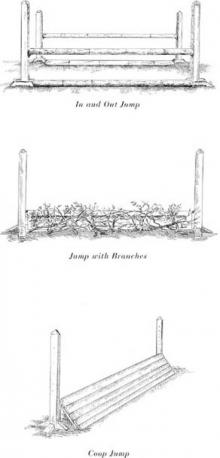 The Georges and the Jewels
The Georges and the Jewels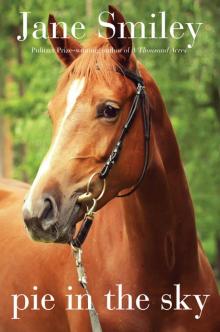 Pie in the Sky: Book Four of the Horses of Oak Valley Ranch
Pie in the Sky: Book Four of the Horses of Oak Valley Ranch Duplicate Keys
Duplicate Keys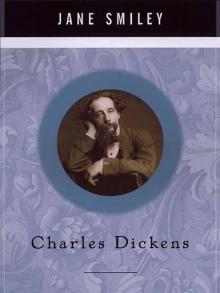 Charles Dickens
Charles Dickens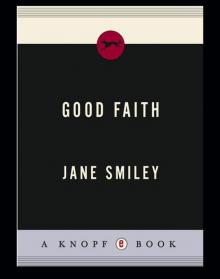 Good Faith
Good Faith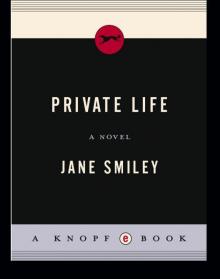 Private Life
Private Life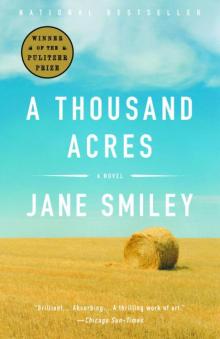 A Thousand Acres: A Novel
A Thousand Acres: A Novel The Greenlanders
The Greenlanders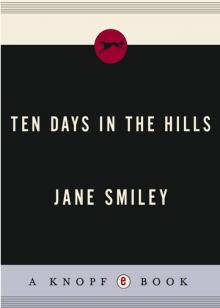 Ten Days in the Hills
Ten Days in the Hills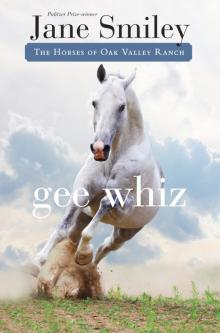 Gee Whiz: Book Five of the Horses of Oak Valley Ranch
Gee Whiz: Book Five of the Horses of Oak Valley Ranch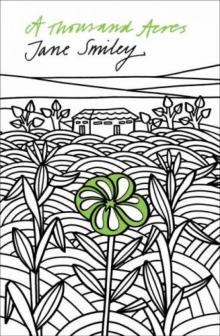 A Thousand Acres
A Thousand Acres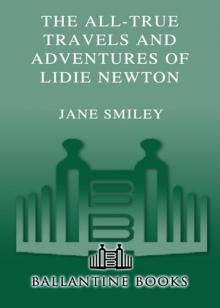 The All-True Travels and Adventures of Lidie Newton
The All-True Travels and Adventures of Lidie Newton Ordinary Love and Good Will
Ordinary Love and Good Will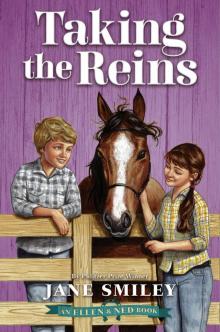 Taking the Reins (An Ellen & Ned Book)
Taking the Reins (An Ellen & Ned Book)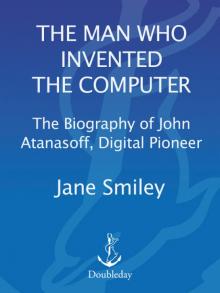 The Man Who Invented the Computer
The Man Who Invented the Computer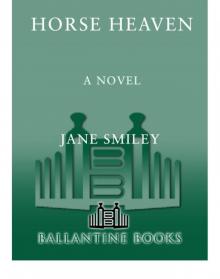 Horse Heaven
Horse Heaven The Age of Grief
The Age of Grief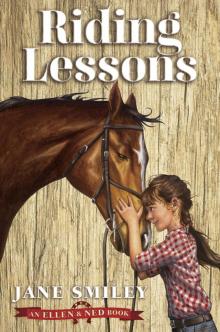 Riding Lessons
Riding Lessons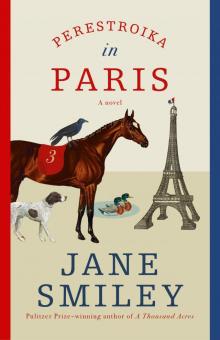 Perestroika in Paris
Perestroika in Paris A Good Horse: Book Two of the Horses of Oak Valley Ranch
A Good Horse: Book Two of the Horses of Oak Valley Ranch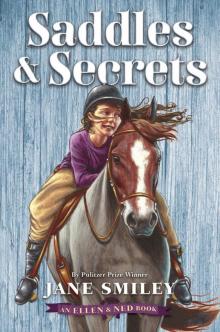 Saddles & Secrets (An Ellen & Ned Book)
Saddles & Secrets (An Ellen & Ned Book)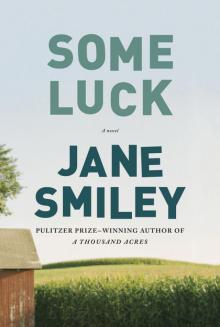 Some Luck: A Novel
Some Luck: A Novel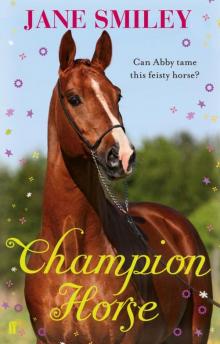 Champion Horse
Champion Horse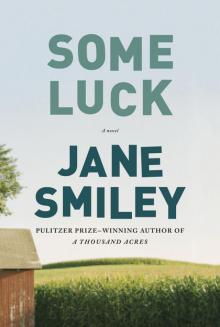 Some Luck
Some Luck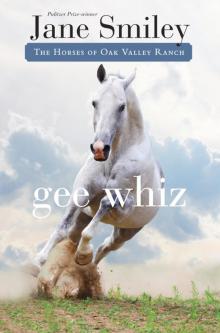 Gee Whiz
Gee Whiz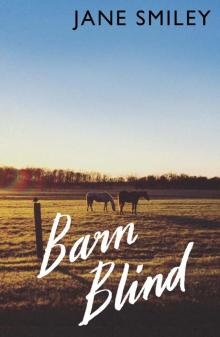 Barn Blind
Barn Blind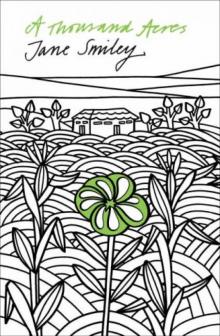 A Thousand Acres (1992 Pulitzer Prize)
A Thousand Acres (1992 Pulitzer Prize)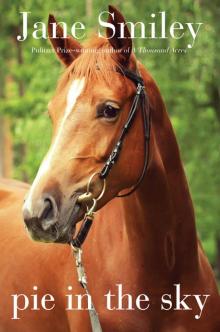 Pie in the Sky
Pie in the Sky True Blue
True Blue A Thousand Acres_A Novel
A Thousand Acres_A Novel A Good Horse
A Good Horse